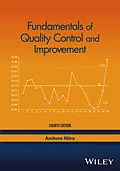A statistical approach to the principles of quality control and management
Incorporating modern ideas, methods, and philosophies of quality management, Fundamentals of Quality Control and Improvement, Fourth Edition presents a quantitative approach to management-oriented techniques and enforces the integration of statistical concepts into quality assurance methods. Utilizing a sound theoretical foundation and illustrating procedural techniques through real-world examples, the timely new edition bridges the gap between statistical quality control and quality management.
Promoting a unique approach, the book focuses on the use of experimental design concepts as well as the Taguchi method for creating product/process designs that successfully incorporate customer needs, improve lead time, and reduce costs. The Fourth Edition of Fundamentals of Quality Control and Improvement also includes:
* New topical coverage on risk-adjustment, capability indices, model building using regression, and survival analysis
* Updated examples and exercises that enhance the readers' understanding of the concepts
* Discussions on the integration of statistical concepts to decision making in the realm of quality assurance
* Additional concepts, tools, techniques, and issues in the field of health care and health care quality
* A unique display and analysis of customer satisfaction data through surveys with strategic implications on decision making, based on the degree of satisfaction and the degree of importance of survey items
Fundamentals of Quality Control and Improvement, Fourth Edition is an ideal book for undergraduate and graduate-level courses in management, technology, and engineering. The book also serves as a valuable reference for practitioners and professionals interested in expanding their knowledge of statistical quality control, quality assurance, product/process design, total quality management, and/or Six Sigma training in quality improvement.
Autorentext
Amitava Mitra, PhD, is Professor in the Department of Systems and Technology and former associate dean in the College of Business at Auburn University, Alabama. He has published over seventy journal articles and currently teaches in the areas of quality assurance and improvement. Dr. Mitra has over thirty years of academic and professional experience, and has conducted courses for professionals in total quality management, quality assurance and statistical process control, design of experiments, and Six Sigma Black Belt training.
Inhalt
Preface xix
About the Companion Website xxiii
Part I Philosophy and Fundamentals 1
1 Introduction to Quality Control and the Total Quality System 3
1-1 Introduction and Chapter Objectives 3
1-2 Evolution of Quality Control 4
1-3 Quality 7
1-4 Quality Control 12
1-5 Quality Assurance 13
1-6 Quality Circles and Quality Improvement Teams 14
1-7 Customer Needs and Market Share 15
1-8 Benefits of Quality Control and the Total Quality System 16
1-9 Quality and Reliability 18
1-10 Quality Improvement 18
1-11 Product and Service Costing 19
1-12 Quality Costs 23
1-13 Measuring Quality Costs 27
1-14 Management of Quality 31
1-15 Quality and Productivity 34
1-16 Total Quality Environmental Management 37
Summary 40
Key Terms 41
Exercises 41
References 46
2 Some Philosophies and Their Impact on Quality 47
2-1 Introduction and Chapter Objectives 47
2-2 Service Industries and Their Characteristics 47
2-3 Model for Service Quality 53
2-4 W. Edwards Deming's Philosophy 56
2-5 Philip B. Crosby's Philosophy 75
2-6 Joseph M. Juran's Philosophy 78
2-7 The Three Philosophies Compared 82
Summary 85
Key Terms 85
Exercises 86
References 88
3 Quality Management: Practices, Tools, and Standards 89
3-1 Introduction and Chapter Objectives 89
3-2 Management Practices 90
3-3 Quality Function Deployment 99
3-4 Benchmarking and Performance Evaluation 106
3-5 Health Care Analytics 115
3-6 Tools for Continuous Quality Improvement 124
3-7 International Standards ISO 9000 and Other Derivatives 137
Part II Statistical Foundations and Methods of Quality Improvement 147
4 Fundamentals of Statistical Concepts and Techniques in Quality Control and Improvement 149
4-1 Introduction and Chapter Objectives 150
4-2 Population and Sample 150
4-3 Parameter and Statistic 150
4-4 Probability 151
4-5 Descriptive Statistics: Describing Product or Process Characteristics 156
4-6 Probability Distributions 173
4-7 Inferential Statistics: Drawing Conclusions on Product and Process Quality 189
Summary 212
Appendix: Approximations to Some Probability Distributions 212
Key Terms 215
Exercises 216
References 228
5 Data Analyses and Sampling 229
5-1 Introduction and Chapter Objectives 229
5-2 Empirical Distribution Plots 230
5-3 Randomness of a Sequence 235
5-4 Validating Distributional Assumptions 237
5-5 Transformations to Achieve Normality 240
5-6 Analysis of Count Data 244
5-7 Analysis of Customer Satisfaction Data 248
5-8 Concepts in Sampling 257
Summary 264
Key Terms 265
Exercises 266
References 272
Part III Statistical Process Control 273
6 Statistical Process Control Using Control Charts 275
6-1 Introduction and Chapter Objectives 275
6-2 Causes of Variation 277
6-3 Statistical Basis for Control Charts 277
6-4 Selection of Rational Samples 289
6-5 Analysis of Patterns in Control Charts 290
6-6 Maintenance of Control Charts 294
Summary 295
Key Terms 295
Exercises 295
References 298
7 Control Charts for Variables 299
7-1 Introduction and Chapter Objectives 300
7-2 Selection of Characteristics for Investigation 301
7-3 Preliminary Decisions 302
7-4 Control Charts for the Mean and Range 303
7-5 Control Charts for the Mean and ...
